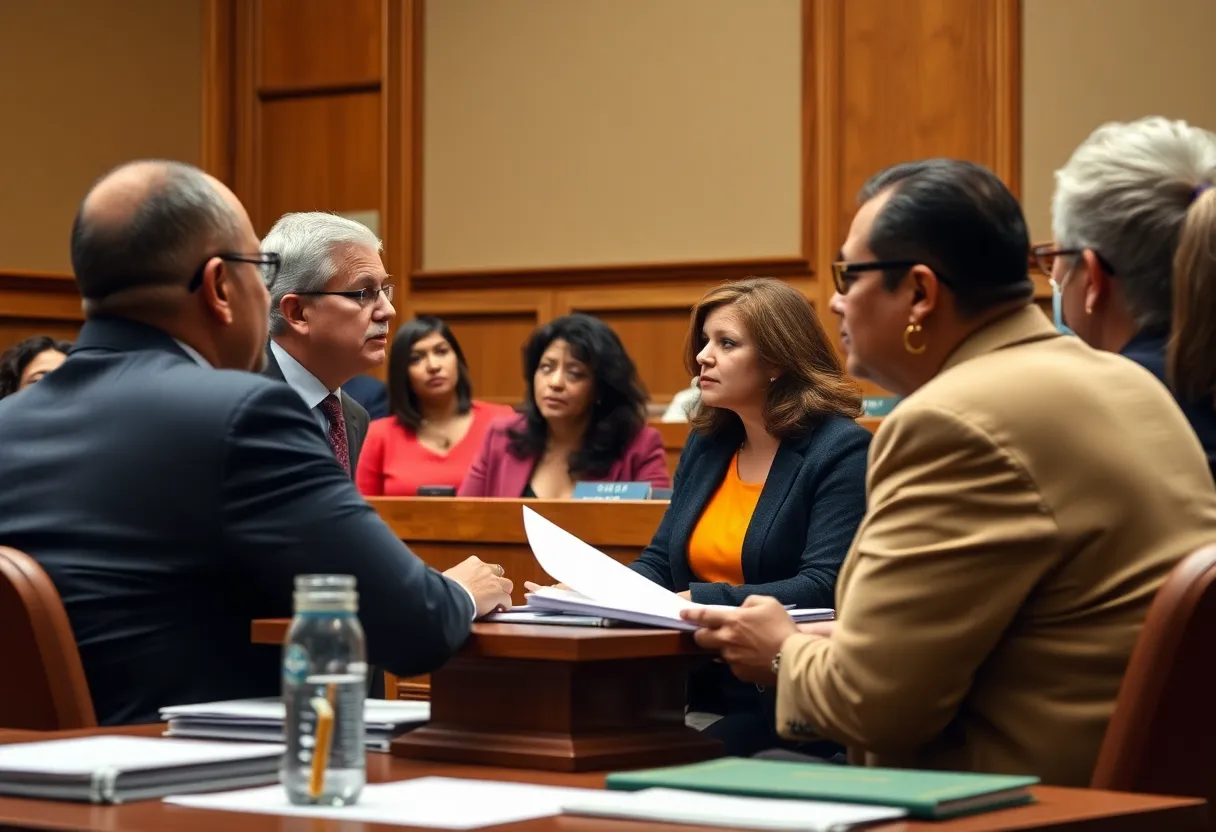

Community members gather for a court hearing regarding the rights of asbestos victims amidst proposed legislative changes.
Montana lawmakers are considering House Bill 803, which modifies the compensation framework for asbestos exposure victims. While proponents argue it streamlines the process, critics fear it could impede victims’ rights and create challenges for accountability. As the bill awaits Senate review, the struggle for justice continues for those affected by asbestos-related diseases.
On April 4, 2024, a chilling presentation took place at the Center for Asbestos Related Disease in Libby, Montana, where Dr. Lee Morissette unveiled heart-wrenching images of lungs severely damaged by asbestos exposure. This stark visual served as a reminder of the ongoing struggle faced by victims of this catastrophic health crisis.
Currently, Montana lawmakers are examining House Bill 803, which seeks to modify the legal framework surrounding asbestos exposure compensation. Proponents of the bill argue that it introduces modest reforms meant to streamline the legal process. The bill proposes forcing plaintiffs to disclose any previous claims made to asbestos trusts and escalating the evidentiary standards required to name defendants in asbestos lawsuits.
Sponsored by Rep. Greg Overstreet, the legislation has garnered support from various organizations, including the Montana Chamber of Commerce and the U.S. Chamber of Commerce. They argue that these changes would help eliminate fraudulent claims and enhance judicial efficiency.
However, the proposed legislation faces fierce opposition from local residents and attorneys who argue that it could provide corporations with loopholes to evade accountability for asbestos-related diseases. Critics fear that this bill may place undue burdens on victims who are already grappling with devastating health challenges.
Prominent voices against House Bill 803 include members of the Montana Trial Lawyers Association, who warn that the heightened evidentiary standards could lead to extended legal delays. For those afflicted by asbestos-related illnesses, time is of the essence. The tragic story of Leslie Kerr exemplifies the urgency; her father, George “Herb” Kerr, was diagnosed with mesothelioma and passed away before his legal claim could be finalized.
Local residents like Kurtis Hafferman have voiced their anxieties, fearing the new bill might hinder swift settlements for victims. The community, still reeling from decades of asbestos contamination linked to the nearby W.R. Grace vermiculite mine—which operated from 1963 until 1990—continues to deal with the repercussions of this public health crisis.
Despite the bill’s supporters declaring urgency in the need for legislative reforms, numerous critics point out that there have been no documented fraudulent asbestos-related cases in Montana courts. This has raised questions about whether changes to the law are warranted at all.
Amidst these legislative challenges, the Center for Asbestos Related Disease is grappling with its own legal troubles, having been named in a lawsuit alleging medical malpractice and wrongful death due to improper opioid prescriptions. The allegations detail a troubling history of misdiagnosis, negligence, and substantial penalties, raising eyebrows about the clinic’s operational integrity.
The clock continues to tick for asbestos victims. Although plans to amend House Bill 803 to exempt Libby asbestos cases are in motion, the looming specter of increased legal hurdles remains for the majority of claimants. Existing compensation structures already face scrutiny, with Attorney Roger Sullivan noting that only 40 out of 2,700 claims have been successfully compensated by available trusts.
As health issues persist for communities affected by asbestos, the need for equitable legislation could not be more critical. Meanwhile, a separate ruling against BNSF Railway underscores the complexities of the legal landscape surrounding asbestos exposure, where the railroad company has been found liable for contributing to deaths linked to asbestos exposure.
As HB 803 awaits a vote from the Senate Judiciary Committee, the outcome of this legislative battle could set a precedent for the treatment of asbestos exposure cases in Montana. With numerous bills already facing significant opposition and being tabled without a vote, the road ahead remains precarious for victims of this environmental catastrophe. The struggles and stories of those affected serve as a powerful reminder of the urgent need for justice and accountability in this ongoing saga.
Lawyers Highlight Asbestos Exposure Challenges in Mesothelioma Cases
Compensation for Mesothelioma Victims: Sokolove Law’s Approach
The Evolving Landscape of Mesothelioma Litigation and the Role of Law Firms
West Virginia University Faces Asbestos Lawsuit: Lawyer Speaks Out
Urgent Appeals for Asbestos Claims: A Call to Action for Lawyers
Asbestos Company Held Liable for Millions in Damages
Family Lawyer Investigates Asbestos-Linked Death of Worker
Colorado’s Legal Titans: 2025 Personal Injury Law Leaders
Controversial BNSF Measures in Montana Legislative Session
Navigating Mesothelioma Litigation: A Lawyer’s Guide
News Summary The Spoleto Festival USA has commenced in Charleston, showcasing over 120 performances across…
News Summary A new tea shop, Oliver Pluff and Co., has opened in downtown Charleston,…
News Summary A house fire in North Charleston early in the morning resulted in the…
News Summary A flood advisory has been issued for Charleston and Berkeley counties due to…
News Summary The Bonnaroo Music and Arts Festival in Manchester, Tennessee, has been canceled after…
News Summary In an extraordinary expression of civic engagement, tens of thousands participated in the…